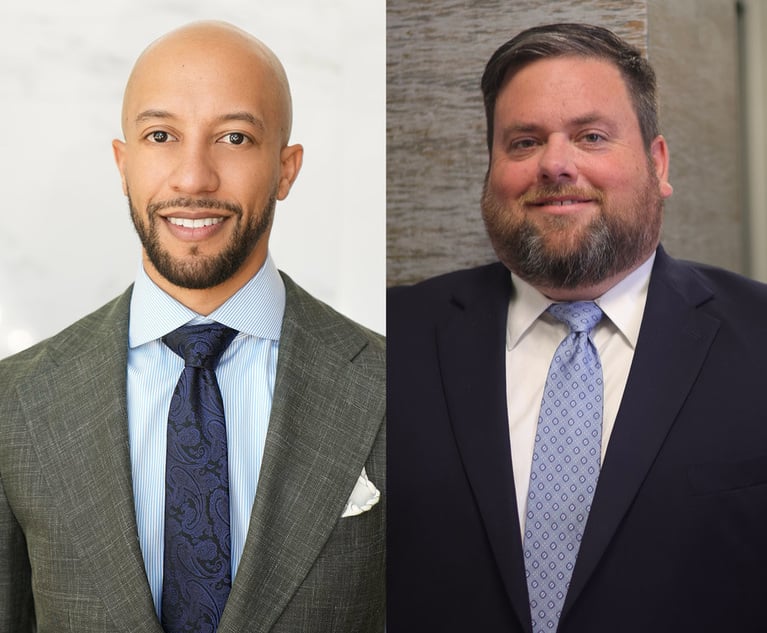Can the Waycross Circuit DA Recall Succeed?
There is a reason Georgia has barely used the recall, and it is not due to a better class of politicians than other states.
July 16, 2020 at 10:54 AM
5 minute read
 Joshua Spivak, senior fellow, Hugh L. Carey Institute for Government Reform, Wagner College, New York. (Courtesy photo)
Joshua Spivak, senior fellow, Hugh L. Carey Institute for Government Reform, Wagner College, New York. (Courtesy photo)
While recalls have become a popular political weapon across the Unied States in recent years, including threats against six governors this year alone, Georgia has mainly stayed on the sidelines. Despite being one of 19 states that allow the recall against governors and other state level officials, Georgia has rarely seen the recall deployed.
Now, after the delayed investigation and his failure to prosecute three individuals in the shooting death of jogger Ahmaud Arbery, Waycross Circuit District Attorney George Barnhill is facing a recall effort. Due to the particulars of Georgia law, getting a recall on the ballot is a challenge. But as history shows, once an election is called, there is an excellent chance at success.
Over the last nine years, Georgia has seen very few recalls get to the ballot—the only one that I've tracked was against Meigs Mayor Linda Eason-Harris in 2016, who was kicked out after being indicted on charges of theft and misusing public funds. Prior to that, you have to go back to Lithonia Mayor Joyce McKibben, who was removed in a 2008 recall. There have been plenty of attempts. Last year, following racially provocative comments and discriminatory hiring policies, Hoschton Mayor Theresa Kenerly and City Councilman Jim Cleveland resigned rather than face the voters.
There is a reason Georgia has barely used the recall, and it is not due to a better class of politicians than other states. While recall laws exist on the local levels in 39 states, only 19 provide the recall for some or all state level officials. These states can be divided into two separate buckets. Eleven states use what is called a political recall law. In these states, an official can face a recall for almost any reason. Petitioners do not need to allege misconduct, such as actual criminal behavior or incompetence in order for the recall to get to the ballot. Nearly every recall of note, like the ones that targeted California Gov. Gray Davis, Wisconsin Gov. Scott Walker or state senators in Colorado over gun control laws, have taken place under the political recall laws.
The other eight states, including Georgia, operate under what can be called a malfeasance or judicial recall (not to be confused with a recall of a judge) standard law. The states require that petitioners show a specific violation of a law, a demonstrable lack of fitness or clearly provable incompetent behavior. These laws vary greatly from state to state. In Illinois, only the governor is covered by recall, and in Virginia, there is no election but rather a judicial hearing as to whether the official should be ousted. But all of these malfeasance standard states share a similar very high bar to get a recall on the ballot—an agency or courts must hold that a statutorily delineated bad act was violated by the elected official in order for the official to be removed.
As an example of how strong this divide is, there have been 46 recalls of state level officials and legislators in U.S. history since 1913. Only one of them, against a state senator in Washington in 1981, has been in a malfeasance-standard state.
Georgia's lack of success with the recall was not foreordained. Arguably, it may be viewed as a case of judicial overreach that has prevented the voters from using the recall as a regular weapon.
Localities have had the recall since at least 1913 in Georgia, with the city of Columbus adopting such a law. But it was in 1978 that voters overwhelmingly approved a statewide recall law, with over 68% in favor of its passage. But a Georgia Supreme Court decision in 1988 invalidated the political recall code that the state Legislature wrote to enact the law, with the justices ruling that the phrase "grounds" in the constitutional amendment meant that the law was a limitation on the use of the recall akin to a malfeasance standard. Two justices, including the chief justice, dissented. The dissent took a vastly more expansive view of the law, one that tracks the recall laws of political recall states, noting that "grounds" were "the vote of majority of electors in a recall election." But this argument did not rule the day.
To get the recall back on track, the Legislature adopted a new recall law in 1989 tracking the Supreme Court ruling and greatly limiting the recall law. While recalls have been attempted, they rarely get to the ballot and are frequently stopped by judges. However, in Hoschton last year, a lower court held that the officials could face a recall due to their failure to establish an ethics board. The Supreme Court refused to hear an appeal on the ruling, effectively greenlighting the recall.
If a recall does get on the ballot, the chances of success are quite high. Over the last nine years, we've seen that about 60% of recalls that get to the voters result in removal. Additionally, another 5% to 7% of officials resign rather than face a vote. The result is that, if petitioners can get the signatures, they have a strong possibility of ousting the official.
While Georgia has avoided the recall fights thanks to limitations in the law, the actions of the Waycross Circuit district attorney may lead the voters to get their say earlier than usual.
Joshua Spivak is a senior fellow at the Hugh L. Carey Institute for Government Reform at Wagner College in New York.
This content has been archived. It is available through our partners, LexisNexis® and Bloomberg Law.
To view this content, please continue to their sites.
Not a Lexis Subscriber?
Subscribe Now
Not a Bloomberg Law Subscriber?
Subscribe Now
NOT FOR REPRINT
© 2025 ALM Global, LLC, All Rights Reserved. Request academic re-use from www.copyright.com. All other uses, submit a request to [email protected]. For more information visit Asset & Logo Licensing.
You Might Like
View All
Trial Court Had No Authority to Reopen Voir Dire After Jury Impaneled in Civil Case, State Appellate Court Rules

'Pushed Into Oncoming Traffic': $5.85M Settlement in Mediated Auto Tort
6 minute read
Justice Known for Asking 'Tough Questions' Resolves to Improve Civility
4 minute readTrending Stories
Who Got The Work
J. Brugh Lower of Gibbons has entered an appearance for industrial equipment supplier Devco Corporation in a pending trademark infringement lawsuit. The suit, accusing the defendant of selling knock-off Graco products, was filed Dec. 18 in New Jersey District Court by Rivkin Radler on behalf of Graco Inc. and Graco Minnesota. The case, assigned to U.S. District Judge Zahid N. Quraishi, is 3:24-cv-11294, Graco Inc. et al v. Devco Corporation.
Who Got The Work
Rebecca Maller-Stein and Kent A. Yalowitz of Arnold & Porter Kaye Scholer have entered their appearances for Hanaco Venture Capital and its executives, Lior Prosor and David Frankel, in a pending securities lawsuit. The action, filed on Dec. 24 in New York Southern District Court by Zell, Aron & Co. on behalf of Goldeneye Advisors, accuses the defendants of negligently and fraudulently managing the plaintiff's $1 million investment. The case, assigned to U.S. District Judge Vernon S. Broderick, is 1:24-cv-09918, Goldeneye Advisors, LLC v. Hanaco Venture Capital, Ltd. et al.
Who Got The Work
Attorneys from A&O Shearman has stepped in as defense counsel for Toronto-Dominion Bank and other defendants in a pending securities class action. The suit, filed Dec. 11 in New York Southern District Court by Bleichmar Fonti & Auld, accuses the defendants of concealing the bank's 'pervasive' deficiencies in regards to its compliance with the Bank Secrecy Act and the quality of its anti-money laundering controls. The case, assigned to U.S. District Judge Arun Subramanian, is 1:24-cv-09445, Gonzalez v. The Toronto-Dominion Bank et al.
Who Got The Work
Crown Castle International, a Pennsylvania company providing shared communications infrastructure, has turned to Luke D. Wolf of Gordon Rees Scully Mansukhani to fend off a pending breach-of-contract lawsuit. The court action, filed Nov. 25 in Michigan Eastern District Court by Hooper Hathaway PC on behalf of The Town Residences LLC, accuses Crown Castle of failing to transfer approximately $30,000 in utility payments from T-Mobile in breach of a roof-top lease and assignment agreement. The case, assigned to U.S. District Judge Susan K. Declercq, is 2:24-cv-13131, The Town Residences LLC v. T-Mobile US, Inc. et al.
Who Got The Work
Wilfred P. Coronato and Daniel M. Schwartz of McCarter & English have stepped in as defense counsel to Electrolux Home Products Inc. in a pending product liability lawsuit. The court action, filed Nov. 26 in New York Eastern District Court by Poulos Lopiccolo PC and Nagel Rice LLP on behalf of David Stern, alleges that the defendant's refrigerators’ drawers and shelving repeatedly break and fall apart within months after purchase. The case, assigned to U.S. District Judge Joan M. Azrack, is 2:24-cv-08204, Stern v. Electrolux Home Products, Inc.
Featured Firms
Law Offices of Gary Martin Hays & Associates, P.C.
(470) 294-1674
Law Offices of Mark E. Salomone
(857) 444-6468
Smith & Hassler
(713) 739-1250







